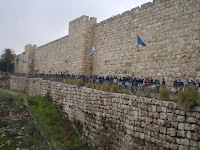
On Tuesday afternoon, as clouds gathered over Jerusalem, I grabbed my camera and headed to the Old City. In anticipation of President Bush's visit to Israel, a group called One Jerusalem organized a rally to oppose Olmert's declaration that Jerusalem should be divided. The rally called upon Israelis to come to Jerusalem and form a human chain around the Old City as an expression of our firm support for a united Jerusalem. It was hoped that this would send a message to President Bush: Jerusalem is the eternal capital of Israel and the Jewish people, and must therefore not be divided.
By the time I arrived at the Jaffa Gate, the human chain went on for as far as the eye could see. From what I observed, the chain was made up of mostly high school and yeshiva students. Many of the participants were singing songs, arm in arm, about Yerushalaim. It was heartening to see that the youth, far from being apathetic, are actually involved, aware and active.
The reasons to keep Jerusalem united are numerous and compelling. Almost immediately, upon liberating Jerusalem in 1967, the Israeli government enacted the Protection of Holy Places law, protecting all holy sites “from desecration and any other violation and from anything likely to violate the freedom of access of the members of the different religions to the places sacred to them...” Every religion is entitled to worship freely under Israeli rule in Jerusalem. Holy sites are protected. This in stark contrast to the period from 1948 until 1967, when Jerusalem was under Arab control and Jerusalemites were subject to religious persecution and holy sites were desecrated and destroyed. (When Arab forces stormed Jerusalem in 1948 they blew up 58 synagogues, rabbinical schools, and other buildings in the Jewish Quarter. Remaining synagogues and other holy sites were used as stables and garbage dumps.)
Dividing Jerusalem would serve to strengthen radical Islam and its proponents, who call for the liberation of Jerusalem and the Al-Aqsa mosque. Arabs living in Jerusalem have come to appreciate, albeit begrudgingly, living under Israeli sovereignty. In an article in US News published this past June, the author wrote that Jerusalem's Arabs recognize that "a Palestinian bystander in Gaza is liable to be killed by a Fatah gunman, a Hamas gunman or an Israeli-fired missile; a Palestinian bystander in Jerusalem is extremely unlikely to be killed by anyone. Notes the local attorney: "The saying you hear [from Arabs] in the city now is 'Give me hell in Jerusalem over paradise in the PA.'" Olmert seems to refuse to respond to what even the local Arab population feels on the issue.
Perhaps most significantly, Jerusalem is of supreme importance to the Jewish people from a religious and Biblical perpspective. The Bible refers to Jerusalem by name over 700 times. Additionally, Rabbinic literature, the Talmud and Midrash, are brimming with references to Jerusalem. The Midrash tells us that the Beit HaMikdash (the Temple) was built in Jerusalem on the very site where Abraham bound Isaac. Yet another midrash locates the site of the Temple as the place where Hevel (Abel) built his mizbeiach (altar) to G-d. This was the first time a human attempted to connect with G-d following the expulsion from the Garden of Eden. King David declared Jerusalem the capital during his reign as monarch of the Jewish people. King Solomon took the political centralization of Jerusalem one step further by building the Temple and creating the spiritual-religious center for the Jewish people. To this day, wherever in the world a Jew may be, he turns in prayer toward Jerusalem.
The rabbis explain that there is a heavenly Jerusalem (Yerushalaim shel ma'alah) perched over the earthly Jerusalem (Yerushalaim shel matah). This idea is anchored in both Isaiah's, as well as Micha's, prophecy. In masechet Taanit 5a, Rabbi Yochanan is quoted as saying: "The Holy One blessed be He declared, ‘I shall not enter the heavenly Jerusalem until I can enter the earthly Jerusalem.'" The relationship between the 'upper' Jerusalem and the 'lower' Jerusalem is clear. We must constantly strive to make the Jerusalem in which we live, Yerushalaim shel Matah, worthy of G-d's presence in order to merit the union between the two Yerushalaim's, for the two are inextricably connected.
As the skies opened up on Tuesday, these thoughts invaded my mind. I gazed at the human chain hugging the towering Old City walls. I stood near Natan Sharansky as he was interviewed by several different news outlets. To stand next to such a hero, as he exercised his freedom of speech at the entrance to the Old City, was quite inspiring. Sharansky criticized President Bush for failing to implement the ideology he has repeatedly outlined regarding terrorist states, such as Hamas. Similar views were echoed by MK Yisrael Katz, Nir Barkat, opposition leader in the Jerusalem City Council, and Yechiel Leiter (former chief of staff to Netanyahu), who called Olmert to task for forgetting that eight years earlier- to the date- Olmert had pleaded with then President Clinton to keep Jerusalem united.
During the rally itself I stood next to a woman in her mid-sixties from Ma'aleh Adumim. Not a religious woman, she told me she had emigrated from Argentina as a teenage girl. When I asked her why, she responded: "Simply, Zionism." Zionism, she explained, guided her then, and is still the primary signpost for her to this day.
Walking home in the rain, through Yemin Moshe, I couldn't help but think of King David's relevant and poetic words from the book of Psalms: "If I forget thee, O Jerusalem, let my right hand forget her cunning. If I do not remember thee, let my tongue cleave to the roof of my mouth; if I prefer not Jerusalem above my chief joy." (Psalms 137)
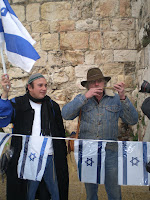
(at the rally: a man blows a shofar)
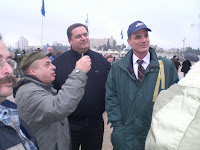 (Natan Sharansky, MK Yisrael Katz, Yechiel Leiter)
(Natan Sharansky, MK Yisrael Katz, Yechiel Leiter)
(top picture: human chain wrapping around the Old City walls)
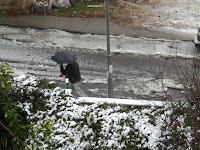 (pedestrian braving the streets beneath my balcony)
(pedestrian braving the streets beneath my balcony)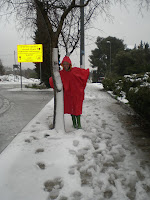 (around the corner from my apartment, in full snow/slush gear)
(around the corner from my apartment, in full snow/slush gear)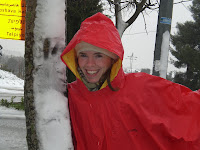 ...look around, leaves are brown now, and the sky is a hazy shade of winter...
...look around, leaves are brown now, and the sky is a hazy shade of winter...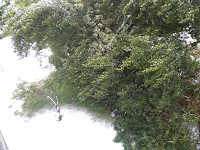

 (at the rally: a man blows a shofar)
(at the rally: a man blows a shofar) (Natan Sharansky, MK Yisrael Katz, Yechiel Leiter)
(Natan Sharansky, MK Yisrael Katz, Yechiel Leiter)